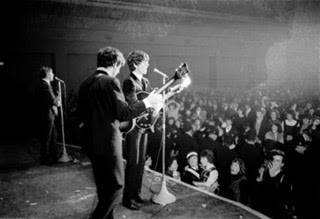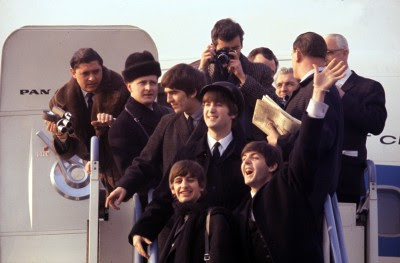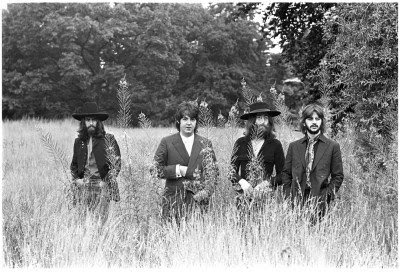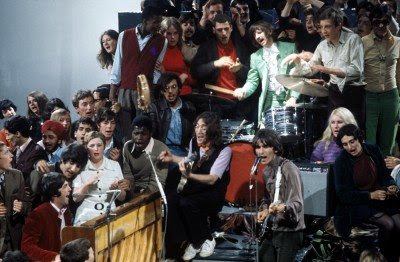 The Beatles, a pop/rock group that formed in Liverpool, England in 1960, were one of the most commercially successful and critically acclaimed bands in the history of popular music. During the band's years of stardom, the group consisted of John Lennon (rhythm guitar, vocals), Paul McCartney (bass guitar, vocals), George Harrison (lead guitar, vocals) and Ringo Starr (drums, vocals). Although their initial musical style was rooted in 1950s rock and roll and skiffle, the group worked with different musical genres, ranging from Tin Pan Alley to psychedelic rock. Their clothes, style and statements made them trend-setters, while their growing social awareness saw their influence extend into the social and cultural revolutions of the 1960s. After the band broke up in 1970, all four members embarked upon successful solo careers.
The Beatles, a pop/rock group that formed in Liverpool, England in 1960, were one of the most commercially successful and critically acclaimed bands in the history of popular music. During the band's years of stardom, the group consisted of John Lennon (rhythm guitar, vocals), Paul McCartney (bass guitar, vocals), George Harrison (lead guitar, vocals) and Ringo Starr (drums, vocals). Although their initial musical style was rooted in 1950s rock and roll and skiffle, the group worked with different musical genres, ranging from Tin Pan Alley to psychedelic rock. Their clothes, style and statements made them trend-setters, while their growing social awareness saw their influence extend into the social and cultural revolutions of the 1960s. After the band broke up in 1970, all four members embarked upon successful solo careers.The Beatles sold over one billion records internationally. In the United Kingdom, The Beatles released more than 40 different singles, albums, and EPs that reached number one, earning more number one albums (15) than any other group in UK chart history. According to the Recording Industry Association of America, The Beatles have sold more albums in the United States than any other band. In 2004, Rolling Stone magazine ranked The Beatles number one in its list of 100 Greatest Artists of All Time. According to that same magazine, The Beatles' innovative music and cultural impact helped define the 1960s, and their influence on pop culture is still evident today. In 2008, Billboard magazine released a list of top-selling Hot 100 artists to celebrate the chart's fiftieth anniversary, with The Beatles at #1
In March 1957 John Lennon formed a skiffle group called The Quarrymen. McCartney met Lennon on 6 July 1957, and agreed to join the group a few days later. On 6 February 1958, Harrison was invited to watch the group by McCartney. Harrison joined the Quarrymen as lead guitarist after a rehearsal in March 1958. Lennon and McCartney both played rhythm guitar during that period. After original Quarrymen drummer Colin Hanton left the band in 1959, the band had a high turnover of drummers. Lennon's friend Stuart Sutcliffe joined on bass in January 1960.
From "The Quarrymen", the band went through a progression of names, including "Johnny and the Moondogs" and "Long John and The Beetles". Sutcliffe suggested the name "The Beetles" as a tribute to Buddy Holly and The Crickets. The band changed their name to "The Beatles" in 1960. The band's lack of a drummer posed a serious problem, as the group's unofficial manager, Allan Williams, had arranged for them to perform at a club in Hamburg, West Germany.
The group invited Pete Best to become their drummer on 12 August 1960. Four days after hiring Best, the group left for Hamburg. The Beatles began a 48-night residency in Hamburg at Bruno Koschmider's Indra Club, and moved to the Kaiserkeller in October 1960, but they then accepted an offer to play at the rival Top Ten Club, thereby breaking their contract with Koschmider.Koschmider was furious, and reported Harrison to the German authorities for having lied about his age, leading to his deportation on 21 November 1960. McCartney and Best were arrested for arson a week later, after setting fire to a condom nailed to the wall in their room in another show of disrespect for Koschmider, and they too were subsequently deported. Lennon returned to Liverpool in mid-December while Sutcliffe stayed behind in Hamburg with his new German fiancée Astrid Kirchherr. The reunited group played an engagement on 17 December 1960 at The Casbah Coffee Club, with Chas Newby substituting for Sutcliffe. The Beatles returned to Hamburg in April 1961, performing at the Top Ten Club again. They were recruited by singer Tony Sheridan (who also had a residency at the club) to act as his backing band on a series of recordings for the German Polydor Records label, produced by famed bandleader Bert Kaempfert. Kaempfert signed the group to its own Polydor contract at the first session on 22 June 1961. On 31 October Polydor released the recording "My Bonnie (Mein Herz ist bei dir nur)", which appeared on the German charts. A few copies were also pressed under the American Decca Records label. When the group returned to Liverpool, Sutcliffe, who had been bass player until then, stayed in Hamburg with Kirchherr, so McCartney, unwillingly, took over bass duties.
The band returned to Liverpool, and on Tuesday, 21 February 1961, they made their first lunchtime appearance at The Cavern Club. From 1961 to 1962 The Beatles made 292 appearances at the club, culminating in a final appearance there on 3 August 1963. On 9 November 1961, Brian Epstein saw The Beatles for the first time in the club. The Beatles signed a five-year contract with Brian Epstein on 24 January 1962. He then formed the management company NEMS Enterprises. Kaempfert agreed to release The Beatles from their Polydor contract. Decca Records A&R executive Dick Rowe turned Epstein down flat, informing him that "guitar groups are on the way out, Mr. Epstein." (See The Decca audition.) While Epstein was negotiating with Decca, he approached EMI marketing executive Ron White.[ White contacted EMI producers Norrie Paramor, Walter Ridley, and Norman Newell, all of whom declined to record the band. White did not approach EMI's fourth staff producer—George Martin—who was on holiday at the time. The Beatles returned to Hamburg from 13 April to 31 May 1962, where they performed at the opening of The Star Club. Upon their arrival, they were informed of Sutcliffe's death from a brain haemorrhage.



 Epstein went to the HMV store on Oxford Street in London to transfer the Decca tapes to discs. There, he was referred to Sid Coleman, who ran EMI's publishing arm. Epstein eventually met with Martin, who signed the group to EMI's Parlophone label on a one-year renewable contract.
Epstein went to the HMV store on Oxford Street in London to transfer the Decca tapes to discs. There, he was referred to Sid Coleman, who ran EMI's publishing arm. Epstein eventually met with Martin, who signed the group to EMI's Parlophone label on a one-year renewable contract.Martin had a problem with Pete Best.Martin privately suggested to Epstein that the band use another drummer in the studio. In addition, Epstein became exasperated with Best's refusal to adopt the distinctive hairstyle as part of the band's unified look. Best had also missed a number of engagements because of illness. Epstein dismissed Best on 16 August 1962. They asked Richard Starkey, known as Ringo Starr, to join the band; Starr was the drummer for Rory Storm and the Hurricanes, and had performed occasionally with The Beatles in Hamburg. Starr played on The Beatles' second EMI recording session on 4 September 1962, but Martin hired session drummer Andy White for their next session on 11 September. White's only released performances were recordings of "Love Me Do" and "P.S. I Love You", found on The Beatles' first album.
The Beatles' first EMI session on 6 June 1962 did not yield any recordings considered worthy of release, but the September sessions produced a minor UK hit "Love Me Do", which peaked on the charts at number seventeen. "Love Me Do" would reach the top of the U.S. singles chart in May 1964.
On 26 November 1962 the band recorded their second single "Please Please Me", which reached number two on the official UK charts and number one on the NME chart. Three months later, they recorded their first album, also titled Please Please Me. The follow up single, "From Me to You", became their first undisputed #1 song. The band's first televised performance was on the People and Places programme, transmitted live from Manchester by Granada Television on 17 October 1962. As The Beatles' fame spread, the frenzied adulation of the group was dubbed "Beatlemania". In 1963, The Beatles' iconic logo (referred to as the "drop-T" logo) made its debut.




komentar
Posting Komentar